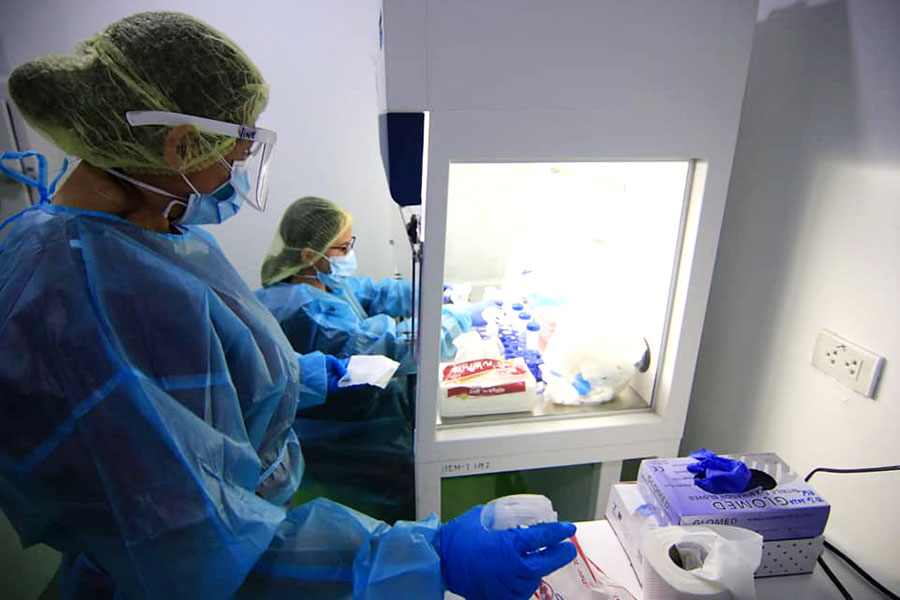
By Joseph B.A. Marzan
The new strain of the coronavirus disease 2019 (COVID-19) that has caused another round of border closures including the Philippines is not the second known strain of the disease, according to a local pathologist.
A more contagious nature and active mutation highlights the importance of preventive measures like physical distancing.
This new strain, according to Dr. Stephanie Abello, Chief Pathologist of the Western Visayas Medical Center (WVMC) in Iloilo City, is a Variant Under Investigation or VUI.
Official documents from the United States’ Centers for Disease Control (CDC) and the United Kingdom’s Public Health England named the new “variant”, under the lineage ‘B.1.1.7’, as “Variant of Concern (VoC) 202012/01”.
Aside from the new strain found in the UK, Abello explained that the B.1.1.7 lineage of COVID-19 has 23 variants, including the latest variant responsible for border closures anew.
The new variant is reported to be 70 percent “more infectious” than the previous variants and was first detected in the town of Kent in the UK last month, and has also been confirmed in around 20 countries as of this writing.
Abello said in an interview with Aksyon Radyo on Monday that the Department of Health’s issuances, and official issuances by international health authorities, continue to refer to the virus as either “VUI or VoC 202012/01”.
She added that several European reports already refer to the variant as “COVID-20”, although this was not yet made official by the World Health Organization (WHO).
She further explained that there are five lineages present in the country.
The first, lineage ‘A’, belonged to the first known COVID-19 case in the country, that of a Chinese tourist that was reported in January 2020.
The second lineage ‘B’ also came from China with a different appearance and came from another Chinese tourist also confirmed in January 2020.
Lineage ‘B’ mutated in appearance, said Abello, to what they called ‘B.1’, which was confirmed in the country in June 2020 through a local case in the National Capital Region without any travel history.
This third lineage was also present in Europe according to the pathologist.
In the same month, the fourth lineage, B.1.1, another lineage present in Europe, was discovered from a confirmed COVID-19 case in Laguna.
The latest strain to hit the Philippines is ‘B.6’, which is present in its Southeast Asian neighbors, primarily Singapore and East Timor.
Abello said that the new strain under lineage B.1.1.7, “alters itself” to avoid recognition by antibodies which protects the body from viruses and other disease causing organisms.
She warned that while the new variant has attributes similar to previous lineages in the country, such as the 14-day incubation period and symptoms, COVID-19 is “continuously dynamic” and may mutate to survive in their hosts’ bodies.
She also added that the new variant binds itself faster to host cells due to mutations in its spike proteins, which further highlights the importance of social distancing.
“If it enters our body, the immune system may ignore it and we may develop illnesses. Although they say that it is not that much grave, the fact is that the virus is continuously dynamic so that when one is weak it may mutate again to survive in the body and hide. Another is that the B.1.1.7 lineage can bind easily because its mutation is in the spike protein, which increases the binding capacity to attach itself to a cell, so it immediately binds itself to the next available cell it sees,” Abello said in the radio interview.
Abello added that these may have implications on COVID-19 testing and the procurement of COVID-19 vaccines, which they are actively monitoring.
She assured that the WVMC’s COVID-19 Sub-National Laboratory has been limited to using testing tools which may detect COVID mutations.
“There are two things being observed by the medical field, the immunological (the response to the vaccine and if the vaccine will be effective against variant strains), and the diagnostic because this may cause diagnostic failures. Two of the testing [suppliers] have issued an update saying that these variations do not affect the testing, and those are the only ones we are using now,” she said.
This new variant has not yet been identified in the Philippines, which is why the WVMC, as well as other accredited laboratories in the country, have been directed to conduct “retrospective studies” on positive cases from November to December 2020.
These studies will be submitted to the Research Institute for Tropical Medicine in Muntinlupa City and the Philippine Genome Center in Quezon City for next-generation sequencing and further surveillance.





















